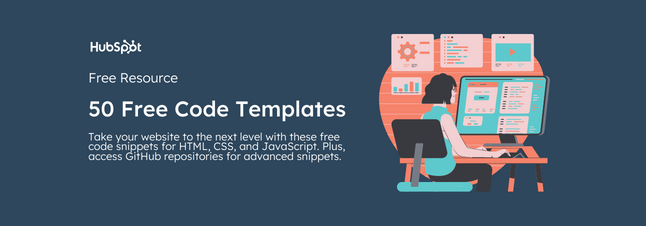Artificial Intelligence (AI) has made significant advancements in recent years, transforming various industries, including education. With AI technology becoming more sophisticated, it has also found its way into the realm of coding education.

In this post, we will explore how AI can help individuals master HTML coding. From providing instant feedback and personalized learning experiences to enhancing collaboration and virtual reality learning environments, AI has the potential to revolutionize the way we learn and develop coding skills.
How AI is Changing the Learning Landscape
AI has made remarkable strides in natural language processing, machine learning, and pattern recognition, making it possible for machines to understand and teach coding languages like HTML. With the ability to analyze vast amounts of data and identify patterns and trends, AI-driven systems can assist in teaching and learning HTML coding in innovative ways. Today's AI can even go as far as creating entire websites for you, albeit with serious limitations, it can get the ball rolling quickly.
The benefits of using AI for learning HTML.
Using AI as a learning tool provides learners with several advantages. AI-driven systems can provide instant feedback, real-time suggestions, and personalized learning experiences tailored to an individual's needs and learning style. Additionally, AI can assist in identifying common coding errors and optimizing code efficiency, allowing learners to improve their coding skills more efficiently.
While AI has made significant progress, it still has limitations in teaching complex coding concepts. Advanced coding techniques, problem-solving skills, and creative thinking are areas where human teachers still play a crucial role. AI-driven systems currently excel in providing technical assistance and foundational knowledge, but human guidance and mentorship are essential for deeper understanding and application.
The Basics of HTML Coding
HTML (Hypertext Markup Language) is the standard markup language used for creating web pages. It provides the structure and content of a web page, defining elements like headings, paragraphs, images, links, and more. Understanding HTML is fundamental for building websites and web applications.
The essential tags and elements of HTML.
HTML consists of numerous tags and elements that define the structure and content of a web page. Examples of essential HTML tags include <html>, <head>, <body>, <div>, <p>, <img>, <a>, <h1> to <h6>, and many more. Each tag serves a specific purpose and has various attributes that can be customized.
How AI can assist beginners in understanding the basics of HTML coding.
AI-driven tools can assist beginners in understanding the basics of HTML coding by providing interactive tutorials, quizzes, and coding exercises. These tools can explain HTML concepts, demonstrate how they are used in practice, and offer step-by-step guidance. AI systems can analyze individual learning patterns, adapt lessons based on progress, and identify areas that require extra attention.
The Role of AI in Enhancing HTML Coding Skills
AI is not just a passive learning tool, but it can actively help users improve their HTML coding abilities. Find out how AI can enhance your coding skills.
AI-powered code editors, such as Microsoft Visual Studio Code with IntelliSense, and GitHub's Copilot, utilize AI algorithms to analyze the code a developer writes and provide real-time suggestions, autocompletions, and error corrections. These AI-powered editors can significantly speed up the coding process and help learners write cleaner and more efficient HTML code.
How AI can help identify and fix common HTML coding errors.
AI-powered code analysis tools can detect common HTML coding errors, such as unclosed tags, missing attributes, or incorrect nesting. Through pattern recognition and analysis of similar instances, these tools can suggest potential fixes and prevent common mistakes. This real-time feedback helps learners understand and correct errors efficiently.
The role of AI in optimizing code efficiency.
AI can assist in optimizing code efficiency by analyzing coding patterns, identifying redundant code, and suggesting more efficient alternatives. By leveraging AI algorithms to analyze code structure and performance, developers can streamline their HTML code, resulting in improved website performance and loading times.
Personalized Learning with AI
How AI can tailor learning experiences to individual needs and learning styles.
AI is capable of adapting learning experiences to match an individual's needs and learning style. By analyzing user data, such as cognitive preferences, knowledge gaps, and learning speed, AI systems can provide personalized recommendations, exercises, and study materials. This adaptive learning approach helps learners focus on specific areas of improvement and progress at their own pace.
The use of AI algorithms to create adaptive learning paths for HTML coding.
AI algorithms can create adaptive learning paths for HTML coding by continually evaluating a learner's progress and adjusting the difficulty level and content accordingly. For example, if a learner demonstrates proficiency in certain HTML concepts, the AI system can skip related exercises and focus on more challenging topics. This personalized approach ensures efficient and effective learning.
The potential of AI in providing personalized coding exercises and challenges.
AI systems can generate personalized coding exercises and challenges based on a learner's skill level and progress. By dynamically adapting the complexity, problem-solving requirements, and real-world relevancy of coding tasks, AI can provide learners with engaging and practical exercises that promote skill development and mastery.
AI vs. Human Teachers: Which is Better for Learning HTML?
With the rise of AI, the role of human teachers in coding education is being questioned. One of the key advantages of AI in teaching HTML coding is scalability. AI-driven systems can cater to an unlimited number of learners simultaneously, ensuring that no learner is left behind. Additionally, AI makes coding education more accessible by providing resources and interactive learning experiences to individuals who may not have access to traditional educational institutions.
AI systems can provide instant feedback and support to learners, helping them identify and correct HTML coding errors immediately. Unlike human teachers, who may need time to review and provide feedback, AI systems can analyze code in real-time and offer suggestions and explanations instantly. This immediate feedback accelerates the learning process and enhances the learner's coding skills.
Through continuous monitoring and analysis of a learner's coding activities, AI systems can track progress, identify strengths, weaknesses, and knowledge gaps. This data-driven approach enables learners and educators to gain insights into individual development and make informed decisions regarding personalized learning paths and interventions.
The Unique Value of Human Teachers
Human teachers bring a unique perspective and expertise to the learning process. They provide context, practical examples, and deeper insights into the world of HTML coding. Human teachers can share their own experiences, answer questions, and provide meaningful explanations that AI systems may not be able to replicate. Moreover, human teachers can connect with their students on a personal level, understanding their specific challenges and adapting their teaching methods accordingly.
While AI systems can assist in teaching the basics of HTML coding, problem-solving skills and creativity are areas where human teachers truly shine. They can guide learners through complex coding challenges, encourage creative thinking, and teach them how to approach real-world problems. Human teachers foster critical thinking and ingenuity, enabling learners to think outside the box and develop innovative solutions.
Human interaction and collaboration are crucial components of the learning process. Human teachers create learning environments where students can engage in discussions, share ideas, and collaborate on projects. These collaborative experiences promote teamwork, communication skills, and the ability to work effectively in a group setting. While AI systems can provide valuable feedback, they cannot replace the social and interpersonal aspects of learning with peers and mentors.
Considerations on AI for learning how to code HTML.
AI has the potential to revolutionize the way we learn and develop coding skills, including HTML. AI-driven tools and platforms provide learners with personalized learning experiences, instant feedback, and real-time assistance. AI-powered code editors optimize efficiency and help learners identify and fix coding errors. However, human teachers provide a unique value through their experience, context, and ability to foster problem-solving skills and creativity. The ideal learning environment combines the strengths of both AI and human teachers, enabling learners to develop a well-rounded and comprehensive understanding of HTML coding.
![Download Now: 50 Code Templates [Free Snippets]](https://no-cache.hubspot.com/cta/default/53/cace6948-d859-40c5-ad73-a401be3aa84e.png)

![Here’s How I Use AI to Level Up My Website’s User Experience [+ Guide]](https://knowledge.hubspot.com/hubfs/how-to-add-ai-to-your-website-1-20241213-9474632.webp)

![6 Use Cases for Generative AI in Cybersecurity [+ Examples]](https://knowledge.hubspot.com/hubfs/generative-ai-cybersecurity-1-20241004-6839217.webp)






